From coaching Jack Harlow to pitching projects, learn how the Mortal Media co-founders revived a classic without living in the past.
You’ve heard the story before: two strangers from different walks of life team up to hustle the biggest egos in California for the chance to feed their families and keep their dreams alive.
While the title and plot may seem familiar, things aren’t always what they seem.
Back in 2017 when Blake Griffin and Ryan Kalil signed on to produce the remake of White Men Can’t Jump, the All-Pro athletes weren’t looking to dust the nostalgia off Wesley Snipes and Woody Harrelson‘s comedic classic.
In a roundabout way, they were Sidney Deane and Billy Hoyle even if their role was reimagining said stars.
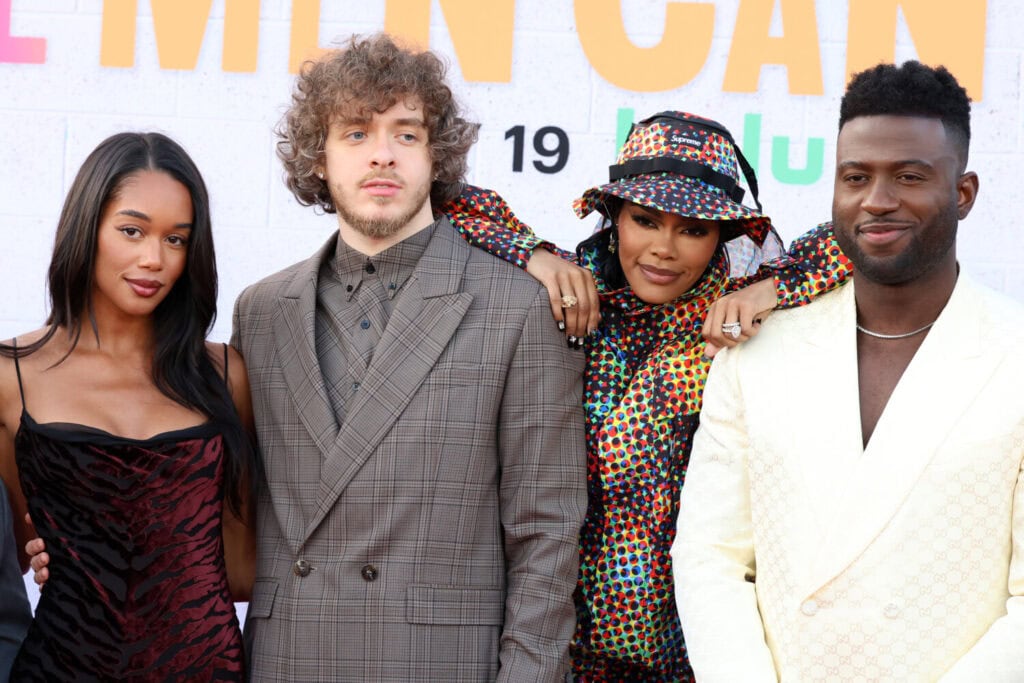
Forming Mortal Media as a passion project between two athletes who loved film despite their demanding day jobs, the unlikely friends rolled up to the toughest studios Hollywood had to offer, looking to shakedown the biggest ballers in showbiz for a chance to play and get paid.
If you think the trash talk on the courts at Venice Beach gets nasty? Trust, parental discretion is advised for the tenor in entertainment offices.
“In sports, you sit in film and listen to a coach tell you how awful you are,” Griffin told Boardroom. “So rejection and someone being brutally honest with you? The sting lessens over time. We took that approach and learned a lot early on.”
Running game against execs, the dream was realized Friday as Mortal Media’s new White Men Can’t Jump is streaming on Hulu.
Ahead of this weekend’s release, Boardroom caught up with Griffin and Kalil to hear how the Hollywood outsiders hustled their way into a high-stakes remake that tackles race, relationships, and not wanting to leave your aspirations behind.
Two Man Game
When Blake Griffin and Ryan Kalil formed Mortal Media in 2016, neither needed more money nor did they desire more attention.
In fact, by the mid-2010s Blake was widely regarded as the best power forward in pro basketball and an MVP candidate. Across the country, Kalil had picked up his second All-Pro first-team selection as a center for the Carolina Panthers.
Already the fodder for sports debate shows, the two athletes met through a mutual friend and aligned behind the scenes to start a production company in Los Angeles. Despite having every outlet at their fingertips, they kept their dreams and cards close to their chest.
“We purposely didn’t put anything out,” Griffin says. “We didn’t publicize that we started a production company. We’d seen that happen over the years and we preferred to show everybody this was something that we wanted to pursue rather than put it out as a vanity play. It helped us be a little more picky about the projects we went after and build relationships before we got to this point.”
Make no mistake: this was not just two fast friends deciding suddenly that they wanted to make movies.
Over the course of his 12 seasons in the NFL, Kalil spent his Sundays snapping the ball to Cam Newton and his summers interning in LA. Having been a standout at USC, he had dreams of writing and working in film.
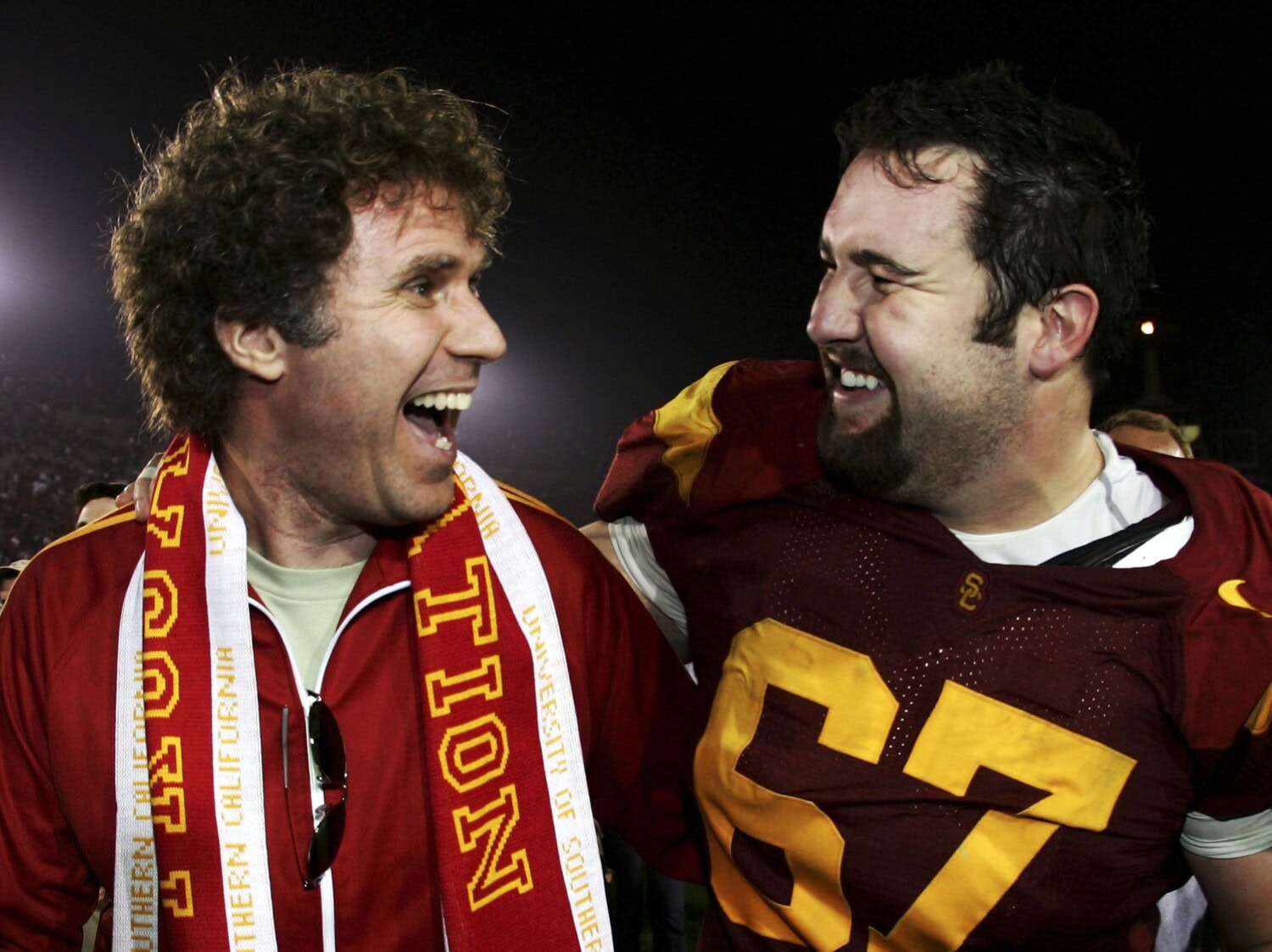
“Most professional athletes would tell you’d they’d love to play long careers, but the game is not so kind sometimes,” Kalil told Boardroom. “Most athletes are thinking about what their next career is and storytelling has always been something I’ve been incredibly passionate about. I always dreamt of getting involved in television and film.”
In Griffin, he found a kindred spirit.
“Even in my first few years in the NFL, the offseason was taking advantage of relationships and networks, just trying to be a sponge,” Kalil says. “Blake and I both share a work ethic that we felt that if we can apply it to this and really learn? We could be taken seriously and find our footing.”
A year into their production partnership, Griffin and Kalil caught their first big break when Kenya Barris and Fox signed on to remake White Men Can’t Jump. It was a mix of emotions.

On the upside, Mortal Media had accomplished its mission of having legitimate work be its introduction to the Hollywood press at large.
On the downside, it was a fast lesson on how slowly the film industry moves and just what shouldering the weight of a remake looks like in realtime.
“I remember a moment at the free throw line boxing out where a guy said, ‘Hey, let me be in White Men Can’t Jump,'” Griffin laughs. “In passing or in warmups there was a lot of that.”
For almost four years, not a peep of press came about of Mortal Media’s modernized White Men Can’t Jump reboot as fans waited and peers pressed Blake and Ryan for roles.
Finally, in November 2021, Calmatic was announced as the director with Jack Harlow and Sinqua Walls cast as the stars shortly after. Momentum was back in motion, as were expectations.
“It’s not your dad’s White Men Can’t Jump,” Kalil says.
For the Love of the Game
When Ron Shelton signed a three-year deal with 20th Century Fox in 1990 he was riding high off the success of Bull Durham, a romantic comedy grounded in the humble habitat of minor league baseball.
For his first at-bat at Fox, he revised the formula of endearment meets moxy with White Men Can’t Jump.
While the time capsule trash talk and nostalgic fashion make the 1992 release a rewatch that’s survived Blockbuster to streaming, there’s an emotion it evokes that’s far deeper than retro aesthetics.
“That’s what I loved about the original: it’s a love story about basketball,” says Griffin. “It’s about two guys not being able to give up the game of basketball even though they’re not playing for anything other than trying to make some money to help their families. That story between their love of basketball and being able to provide and find their purpose in life is beautiful.”
Not only was the original a heartfelt hit, but it was also a commercial slam dunk.
Signing on stars of the established and rising ranks, the 1992 classic cost $31 million to make but brought home nearly $91 million at the box office.
As expressed, it remained relevant in culture for the remainder of the ’90s and well into the ’00s and ’10s when the Mortal Media tandem was playing their own pickup game in Studio City.
While Griffin had appeared on Comedy Central roasts and Kalil had cut his teeth with NFL Network, neither had properly pitched the concept of a movie meant to make and cost millions. It was a whole new arena for each athlete, but one blessed with beginner’s charm.
“We weren’t intimidated by it because we didn’t know how difficult it is,” Griffin says. “We didn’t want to skip any steps and we just went after it. Going into a pitch now? It’s a pitch and you feel a lot more comfortable. What we didn’t know helped us but we asked a lot of questions to learn as much as possible.”
As the story goes, the road to greenlighting the remake came with many stop signs. Rejection didn’t deter either Griffin or Kalil who made the most of their existing industry connections and slightly offset offseasons.
Though most meetings were met with ‘thank you for your time’ or ‘we’ll get back to you’ pleasantries, a sitdown at Fox proved different.
“In 2017 it was just another general meeting we took with Kenya Barris,” says Griffin. “We floated the idea of remaking White Men Can’t Jump. The thing that excited me was that the landscape of basketball culture has changed so much. This movie was made before the Dream Team globally changed basketball.”
Truth be told, it was believable in 1992 that a funky white boy with a set shot could pull up on a park with no rep and leave with cold hard cash.
In the Instagram era where YouTuber hoopers are household names, the element of surprise and domain for games has shifted drastically.
“Guys aren’t going to the park to hustle people anymore,” Griffin says. “You can’t do it in the same way those guys did. Everybody complains about remakes but for certain movies? It’s fun to see what it would look like in this era because it’s been so long.”
Sometimes history repeats itself — even in business.
Like Shelton almost 30 years prior, Barris was beginning a writing deal with Fox.
Soaring off the success of Black-ish, Barris began writing the Mortal Media project while the situation around him adjusted. Months after inking the agreement to remake the Shelton classic, Disney acquired Fox for a whopping $71.3 billion.
The following few years saw a series of reorganizations and rebrands while the pandemic in 2020 shifted production schedules and surged streaming.

All the while, the fate of White Men Can’t Jump waited in the wings as the world, business, and basketball all changed.
Thankfully, pressure makes diamonds and time allows a more pointed perspective.
“We were really cognizant of the title and thought a lot about tone and how to capture the culture and humor of the original while letting it be its own thing,” Kalil says. “It always comes down to what’s the human story.”
With production paused and the world at a standstill for the majority of 2020, the climate around conversations regarding race and the tensions surrounding the future as a whole increased the appetite for sports and perhaps the need for comedy.
All the while, the lifeblood of basketball remained relevant as a place for cultures to connect. Just the same, the spirit that made Hoyle and Deane both aspirational in relatable in 1992 was just as relevant – though different – decades later.
“ESPN runs coverage of The Basketball Tournament every summer where college guys and overseas guys will come back and the prize is $1 million,” says Griffin. “The beauty of basketball today is that it’s become so big that there are tournaments all over. Guys are keeping the dream alive or making some money here and there, but the thing that keeps people coming back is the love of basketball.”
Finally, in 2021, that same love of basketball led to the White Men Can’t Jump reboot getting off the ground.
That’s when the real hustling began.
Game On
Between the announcement of the new White Men Can’t Jump and the actual shooting of the reboot, much had changed around the world and within the walls of Mortal Media.
Ryan Kalil had retired from the NFL and Blake Griffin had moved from Los Angeles to Detroit to Brooklyn. Back in LA on set, the process of being in the production business had fully set in.
“When we started filming last spring it was like, ‘Wow, I can’t believe this is actually happening,'” says Griffin. “It had been five years at the time.”
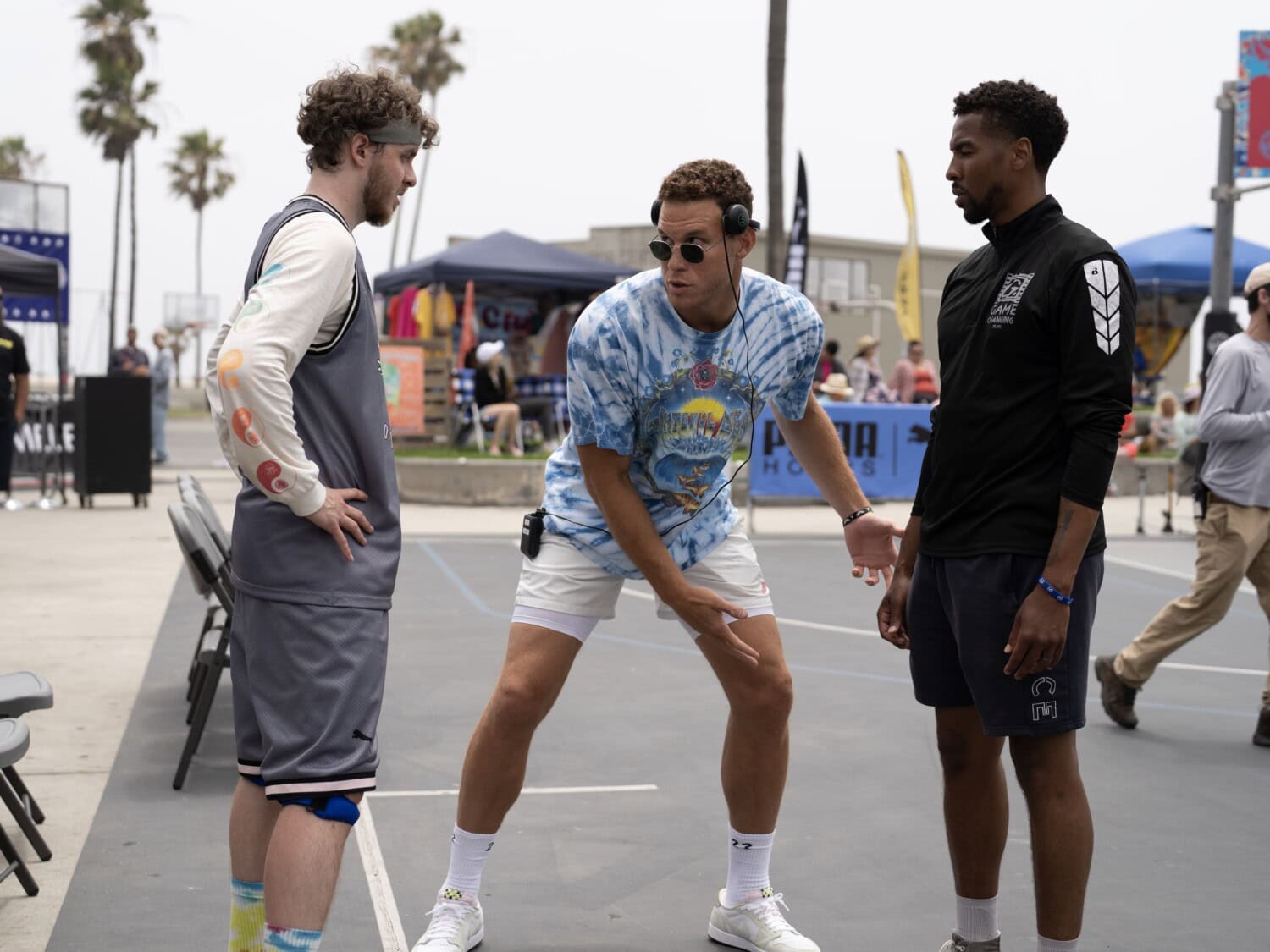
For a kid who grew up watching the original on VHS before buying it in the Apple Store as a college student, the weight of revitalizing a classic was not lost on him. While the pressure to please pundits and proximity to A-listers in the NBA and Hollywood could’ve easily swayed the ship, Griffin and Kalil stayed steadfast at keeping the reboot both authentic and story-driven.
“We wanted to be cognizant of not throwing in as many names as you possibly can,” Griffin says. “To us, it was more important about getting the script right and getting the cast right. It’s not the Entourage movie where we cut as many cameos as possible. We wanted to make the basketball feel authentic through the film, through the script, and through the scenes that we were shooting.”
To do so, Griffin was hands-on in the filming, picking up lessons he’d learned on set at Jordan Brand commercials while leaning into his own All-Star pedigree.
“Doing the scenes over and over while still having the shiftiness of real basketball is not easy to do,” Griffin says.
Working with the talent, Blake likens Sinqua’s game to Dwyane Wade due to his strong stature and D1 basketball background. Conversely, he sees Harlow as a Luke Ridnour type.
Though the shaggy hair and confident prowess proves similar to the former Seattle Supersonics point guard, it’s Harlow’s ability on screen that’s even more impressive than his ability to move around them.
“People are going to be very surprised by Jack and how good he was,” Griffin says.
“Blake’s big advice for Jack was, ‘You’re not going to be able to look the part just training a few times a week. You’ve gotta have a basketball with you at all times,'” says Kalil. “They said Jack was traveling on tour with a basketball, dribbling between arenas. He took that to heart and it was cool to see because it definitely translated on film.”
On May 19, 2023, the world will find out just how tight Harlow’s game is in this new arena.
Just the same, they’ll make the same judgments about Griffin and Kalil.
The White Men Can’t Jump remake is Mortal Media’s first big splash in an industry they’ve strived to swim in for the last seven years, but far from their last lap.
Phase 2
The same day White Men Can’t Jump debuts on streaming, Blake Griffin played host to the Miami Heat in the Eastern Conference Finals.
As a veteran member of the Boston Celtics, Griffin has gained favor as the consummate teammate when it comes to humor, humility, and advice.
For someone who’s won Dunk Contests and appeared on the cover of video games, taking on a role out of the spotlight for the chance at a bigger win is something he’s embraced in both basketball and Hollywood.
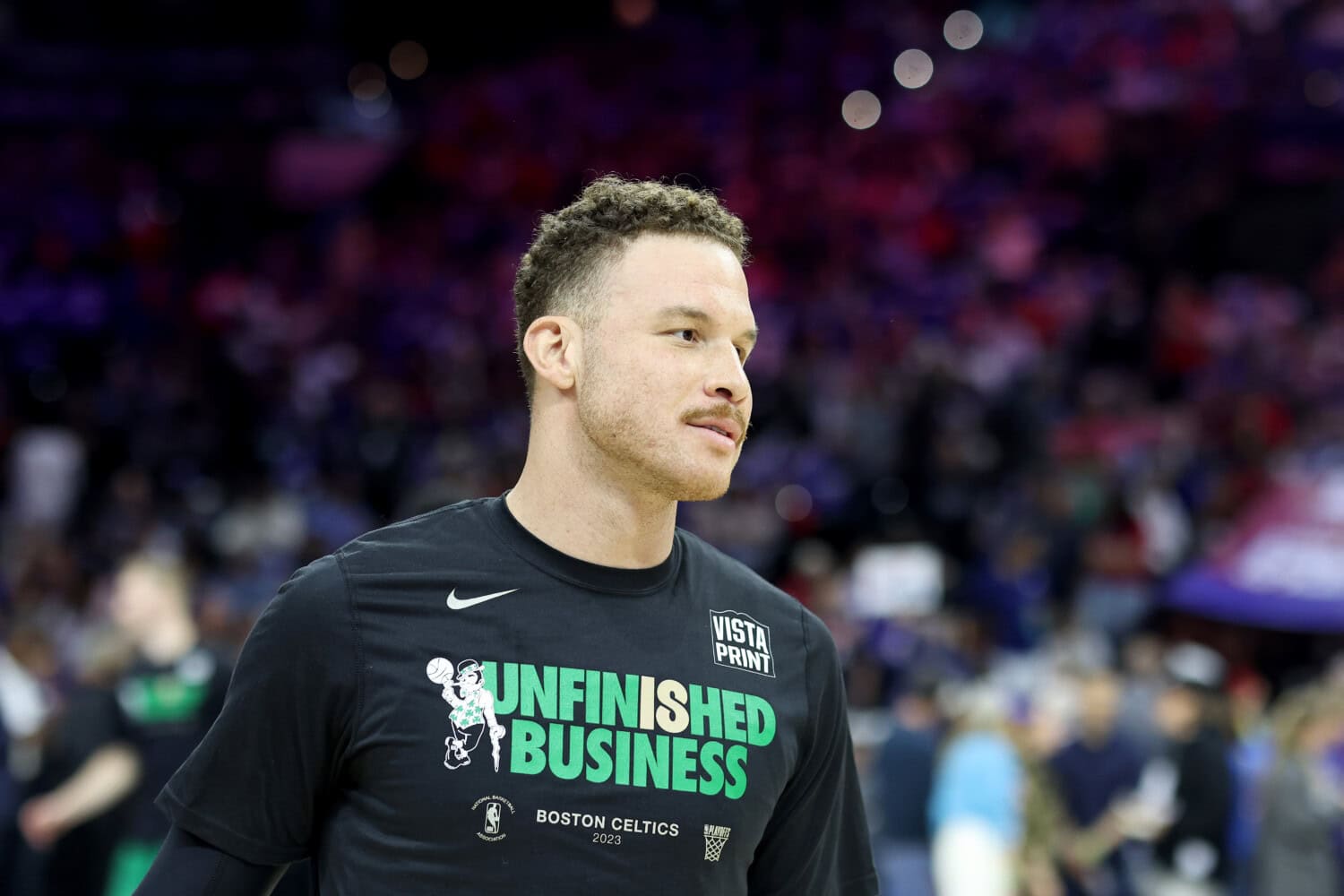
Such was the story last summer on set.
“The thing I took away the most is that being a producer is sort of like being a GM for a team,” says Griffin. “You’re trying to put these pieces together but at some point, you have to have the ability to just let people do what they do. Hovering over people and trying to give notes all the time? That’s clearly not the right way to go. We hired the right people, trusted them to make the right decisions, and every day there was a learning moment.”
Kalil sees it the same.
“Just like a sports team? Everybody wants to win but everybody has different ideas on how to win,” says Kalil. “It’s a lot of different personalities and trying to get everybody on the same page.”
This summer, Griffin hopes to win big in basketball and on Hulu. Working towards a title, he’ll be a free agent once this current season ends, potentially auditioning for his next role in the NBA.
All the while, he’ll have his plate full working with Kalil on a slew of Mortal Media productions set to take shape.
From an array of original stories to unscripted sports shows, the two athletes have a laundry list of projects in the works led by The Rocketeer reboot. Just as Griffin surprised shot blockers in his early arrival with the Clippers, he and his new running mate are no longer flying under the radar but flying high.
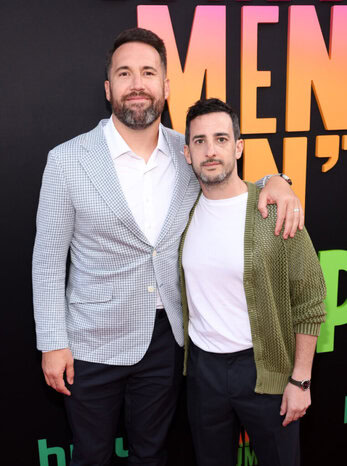
“We’ve been trying to lean into the outsiders coming in and being disruptive, but it’s getting harder now that we’re building resumes to play dumb,” Kalil says.
Due to the buzz surrounding White Men Can’t Jump, the production duo is not just confident doing the pitching but often angled at by studios to produce projects they already have in mind.
Naturally, the athletic accomplishments of both Griffin and Kalil see softballs associated with sports sent their way more often than not.
While they’re not opposed to dominating in said category, their ambitions are more lofty and less obvious.
Still, it’s their first jobs as adults that set the stage for living out their adjacent dreams.
“There are a few carryovers from sports to this, and one of them is resiliency,” closes Kalil. “It’s a lot of rejection, hard work, and continuing to push through. Blake and I are so competitive that whether it’s agents or studios telling us it can’t be done? We sort of jump at that.”
Sometimes, it’s the ones you assume can’t jump that surprise you the most.